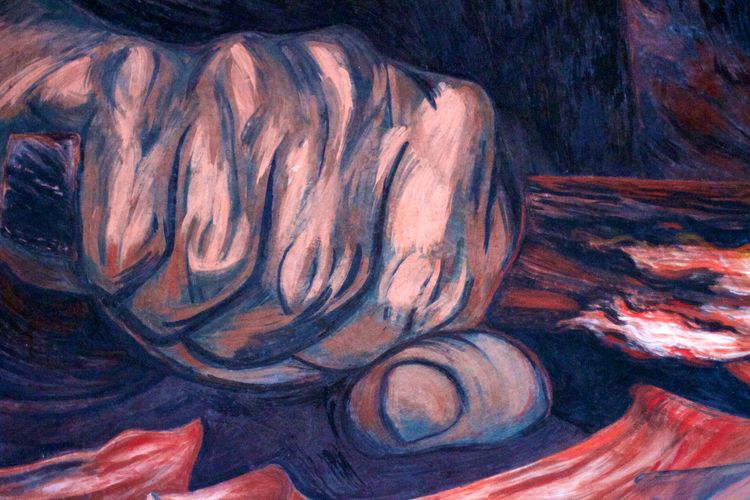A Stiff Upper Lip | Why Men Must Be Courageous

“It is not the strongest man who will necessarily lead, it is the man who takes the lead who will lead…At the most primal level, asserting your interests over the interests of another man requires a potential threat of violence. This is how men have always sized each other up, and this is how they size each other up today.” -Jack Donovan ¹
Military veteran George S. Patton once said, “courage is fear holding on a minute longer.” ² Philosopher Rollo May describes courage as “the capacity to meet the anxiety which arises as one achieves freedom.” ³ Writer Mark Twain declares that true “courage is resistance to fear, mastery of fear—not absence of fear.” ⁴ Whichever definition you ascribe it, they all have one thing in common: a strong tolerance to unknown circumstances. You cannot have courage unless you are willing to be uncomfortable—to accept the possibility of negative consequences. Courage, then, is not the absence of fear; fear is the absence of courage. And for men to enact their will upon the world, they must be willing to overcome their fears if they are to fulfill their visions.
The negative repercussions from cowardice are countless throughout history. One such example is the Chinese Military during the Rape of Nanking. A 1937 New York Times article wrote that “The mass executions of war prisoners added to the horrors the Japanese brought to Nanking. After killing the Chinese soldiers who threw down their arms and surrendered, the Japanese combed the city for men in civilian garb who were suspected of being former soldiers.” ⁵ Hundreds of thousands of unarmed civilians were brutally killed and raped during the occupation. If the Chinese military had banded together and not let fear get the best of them, then perhaps they could have saved lives.
Some might argue that amidst such circumstances, bravery would have been foolhardy and would not have changed the outcome of events. However, even if death was inevitable, how a man dies is equally important, if not more important, than how he lives. If a man survives at the cost of his family or loved ones, how does he live with himself? A guilty conscience is too burdensome to bear for most men, at which point they will wish they had died. The shame inflicted by cowardice is a wound most men will never recover from, and even if one does, a scar will always remain as a reminder. Courage, the ability to triumph over fear despite outcomes, is what makes a man stand on his own two feet and spit in the face of Death.
How a man faces death reflects how he lives his life. A courageous man understands and accepts that any action or inaction may harm him in ways he cannot predict. He knows that life is fleeting, that every second draws him closer to the end. The hand of fate does not discriminate, and as soon as his time comes, his existence will end with just the snap of its finger. In a way, the most courageous act a man can make is to continue living despite suffering. But how does a man live courageously amidst uncertainty? How does he develop a sense of fearlessness? The answer is not ignoring fear—but embracing it.
“Fear is the mind-killer. Fear is the little-death that brings total obliteration,” ⁶ wrote author Frank Herbert. Indeed, fear is a dizzying experience and often can induce pathological behaviors as a coping mechanism. Men who are not taught how to process fear will falter when they are given the opportunity to fight. Cowardice must be uprooted out of a man’s psyche by instilling in him the mental fortitude of outcome independence. It’s much easier to train this mindset in a boy while they are still developing, but it's not impossible to instill it in a man, albeit it is perhaps more difficult.
Courage requires outcome independence—to not be afraid of what might happen. A man must embrace his fear and remain self-assured regardless of circumstances. After all, “Fortune favors the bold”, as the famous Latin proverb states. A man can develop boldness by taking calculated risks—by taking actions he would not permit himself otherwise to do. Remember, the road to victory is steep and paved with failure. You will stumble and fall many times before reaching your destination. A coward’s path is smooth and wide but it always leads backwards. You may never stumble but you will also never reach your destination either. It is a life of ceaseless retreat.
Men must be courageous to leave their mark upon the world. They must be willing to sacrifice for a cause greater than themselves. Those who lack these ideals will forever live in the shadows of men who though may not have been the strongest, fastest or smartest, were still able to conquer their fears. The bystander effect is a common phenomenon in collectivist societies. A man’s desire to do what he believes is right will be challenged by his need to conform to those around him. Courage requires one to be a staunch individualist even among his collective peer group. Therefore, learn to become self-reliant. If you can keep a stiff upper lip and embrace your fears, you too, can be a leader of men.



